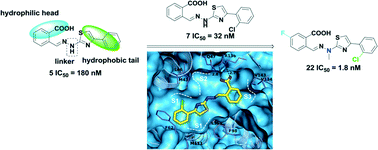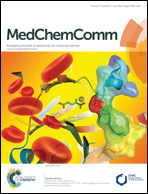Structure-based design of potent human dihydroorotate dehydrogenase inhibitors as anticancer agents†‡
Abstract
It has been proven that inhibiting human dihydroorotate dehydrogenase (hDHODH) restricts the growth of rapidly proliferating cells, thus hDHODH can be developed as a promising target for the treatment of immunological disease and cancer. Here, a succession of substituted hydrazino-thiazole derivatives were designed, synthesized, and biologically evaluated through structure-based optimization, of which compound 22 was the most potent inhibitor of hDHODH with an IC50 value of 1.8 nM. Furthermore, 22 exhibited much better antiproliferative activity than brequinar, both in HCT-116 and BxPC-3 cancer cell lines. Flow cytometry analysis revealed that 22 induced S phase cell cycle arrest and promoted induction of apoptosis. All results established a proof that blocking the pyrimidine de novo synthesis pathway by inhibiting the rate-limiting enzyme hDHODH is an attractive therapy for cancer.


 Please wait while we load your content...
Please wait while we load your content...